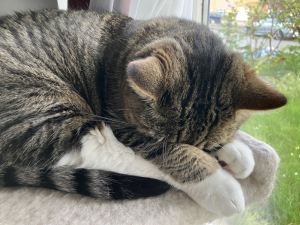 It might be a messy, complicated thing with a variety of causes and potential solutions, but it absolutely does exist.
It might be a messy, complicated thing with a variety of causes and potential solutions, but it absolutely does exist.
It’s been a busy couple of weeks since my last newsletter. I finished the first draft of Fieldwork, my half-hour sitcom pilot script, and wrote about how much prep went into it, compared to the 8 hours and 41 minutes it took to write. And there’s been a lot going on with the day job, which is all to say that when I came to write this week’s newsletter, I really wasn’t sure what to write it about.
I eventually found myself searching for “myths about writer’s block”, as I thought that might be a good topic. Imagine my surprise when Google served up several pieces asserting that writer’s block simply doesn’t exist. Some of the people making these assertions are professors. Others are writers. All of them should know better.
Some reject the whole premise outright and say that it’s just an excuse to not write. Others reject the term but recognise the concept and prefer different words to describe the same thing. Some reject the term, reject the concept, then go on to talk about something that looks suspiciously like… writer’s block. One particularly harsh take was that anyone who has writer’s block isn’t even a writer.
Yet all these “writer’s block is a myth” posts still managed to make suggestions for how people should tackle writer’s block, usually by suggesting that the afflicted should just put their heads down and write anyway. Which, to my mind, somewhat misunderstands the whole problem. (Forcing yourself to write can be a solution, but there are many others activities that can also help.)
So I’m here to say that writer’s block, as in “the inability to begin or continue writing for reasons other than a lack of basic skill or commitment”, as writing expert Mike Rose put it, exists.
I say that it exists partly because I’ve experienced it, partly because I know lots of other people have experienced it, but mostly because academics have studied it, and it’s notoriously difficult to study something that doesn’t exist. And there’s even a test for “writer’s apprehension”, which is a slightly different way to think of and describe writer’s block.
(Before you rush off and take it, though, it’s aimed at students and not at professional writers so fairly useless outside of the academic experience. Apparently my score shows a “troublesome […] lack of apprehension” and whilst I “do not fear writing or evaluation of writing”, I “may not be adequately motivated to work on [my] writing”. Hilarious.)
Reading these posts, which I’m not going to link to because I don’t want to give them oxygen, has made me rather cross. They display not just a lack of empathy for others but also the arrogance to think that their experience is the only valid experience. Yay, well done that you don’t experience writer’s block, but many people do, whether briefly or over the long term, and it’s a really frustrating and miserable experience.
What is true is that writer’s block is an umbrella term for a number of different issues which all result in someone not writing when they really want to or have to. These various causes, as I wrote last month, fall into four categories:
- Physiological causes: Stress, anxiety, extreme emotional states such as grief, mental or physical health issues, and exhaustion.
- Motivational causes: Fear of criticism, performance anxiety, and lack of enjoyment.
- Cognitive causes: Perfectionism, problems associated with over-planning or under-planning, and rigid thinking, such as forcing a story to move in a certain direction.
- Behavioural causes: Procrastination, interruptions to writing, and being too busy to write.
And because human beings are messy, some people may find that they experience a combination of problems that fall into more than one category. And because of this, solutions may not be as simple as just pushing through and forcing oneself to write (although that can work in some cases). Some people might need to peel back the onion layers of their block’s causes and work through multiple solutions over a period of time before they reach a place of comfort and confidence in their writing abilities.
Writer’s block is a symptom with multiple physiological, motivational, cognitive or behavioural causes, not a cause itself. If I am stressed, then that causes writer’s block. It’s not that I’ve got writer’s block therefore I can’t write.
That would be like saying runny noses cause colds. There are over 200 different viruses that can cause a cold. Those viruses inflame the mucous membranes in the nose and throat, at which point our nose turns into Niagara Falls. But if we don’t have the virus, we don’t have a cold.
The direction of causality here is important. If you think some sort of nebulous undefined ‘block’ thingie is the cause of an inability to write, then of course you’re going to look at the whole idea suspiciously, because you’re not understanding causality properly. If you don’t understand lift, flight look like magic.
No one, however, is served by these high-handed dismissals of what is actually a fairly widespread and well-studied experience. Indeed, if you come across anyone who rejects the idea of writer’s block, send them my way. I have some choice words for them.
Meanwhile, what is your experience of writer’s block? Are you suffering from it now? Have you had one or more bouts of short-term block that lasted a few weeks or days? Or have you experienced a longer term block that lasted months or years? Let me know in the poll on Substack.
{ Comments on this entry are closed }





